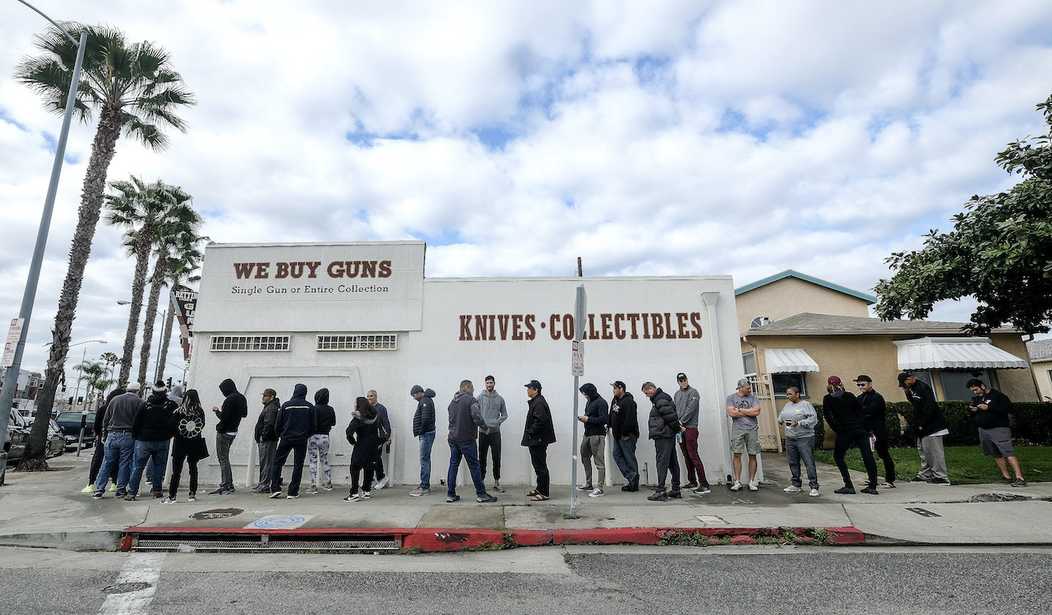MSNBC’s Chris Hayes channeled his inner Shannon Watts on the issue of guns and crime this week, declaring on his show on Wednesday evening that the record-high gun sales are to blame for the record spike in homicides in many cities.
“One piece of this puzzle that seems to not get much attention is the truly shocking proliferation of guns in the last year, which coincided with this rise in shootings and murder. Now, the causal relationship is not settled by any means. But 2020 was the biggest year for gun sales in American history ever, ever.” Hayes claimed.
Hayes also emphasized the number of guns purchased in 2020 based on a Washington Post analysis on gun background checks and concluded that there is a “relationship” between increased crime and increased gun ownership.
“Last year, Americans bought 23 million guns. Sixty-four percent increase over 2019 sales, according to Washington Post analysis of federal data on gun background checks. That’s part of a larger trend which is an acceleration of gun sales in the U.S. in the last ten years.” Hayes said “America is a violent place. America has a lot of guns. And last year, American’s got a lot more guns and got more violent. Is it crazy to see a relationship between these two simple stark facts?”
We can debate whether or not it’s “crazy,” but it’s certainly simplistic to the point of inanity. Homicides and shootings started spiking in June of last year, but the Great Gun Run of 2020 kicked off in March; when the first stay-at-home orders sent millions of Americans to stand in line at gun stores around the country before hunkering down in their homes.
Crime didn’t spike in March, April, or May. In fact, gun control activist David Chipman mocked new gun owners last April for buying firearms for personal protection, assuring us all that the “zombies” weren’t coming.
“If we can imagine how horrible this crisis is … the people who hoarded the guns might decide six months from now – once they see no zombies around but they’ve run out of tuna and beef jerky – that they need the money to buy food,” Chipman said.
People didn’t buy guns because they were concerned about zombies. They flocked to gun shops because they were concerned that the pandemic and the government’s response was leading them into uncharted waters. It was fear of the unknown, not fear of a zombie invasion, that caused the first spike in March.
As it turns out, Chipman’s prediction was dead wrong. Six months after he proclaimed that all those first-time gun owners were going to regret buying a gun because they wouldn’t have money for food, gun sales were still soaring, and at that point it was concern about the civil unrest, rioting, looting, and disorder that had been playing out in city streets across the country for the past several months that was driving sales. In fact, a report by the Chicago Sun-Times makes it clear that the crime surge started with the death of George Floyd in Minneapolis in late May.
What’s more, 2020 gave way to the single deadliest day in Chicago’s modern history. On May 31 — as the city was roiled by protests and looting spurred by the killing of George Floyd by a Minnesota police officer — Chicago recorded a staggering 18 murders in 24 hours.
… Violent crime rose in major cities all across the country, but Chicago saw the most murders of any American municipality, nearly matching the combined totals of New York City and Los Angeles, according to records from all three police departments.
It was not the kind of start that Brown had hoped for. The retired Dallas police chief was picked to lead the CPD in April as the coronavirus pandemic was taking hold, upending daily life for everyone.
Shortly after taking over, Brown set a lofty goal: keep Chicago’s murder total under 300 for the year — something that hadn’t happened in more than 60 years.
A department restructuring begun by Brown’s predecessor, Charlie Beck, was quickly changed as violence surged amid protests and two rounds of widespread looting.
In April of 2020 Chicago’s new police chief was publicly stating that Chicago’s homicides would reach a 60-year low. Instead of fewer than 300 murders, the city ended up with 774 homicides thanks to the violence that exploded after Floyd’s death.
It’s hard to blame the sharp increase in shootings and homicides in Chicago on new gun owners and new gun sales, given the fact that when the violence started soaring in May of last year, there was a 120-day wait, on average, for Illinois applicants to receive their FOID card. In other words, most Chicagoans who wanted to buy a gun in March of last year were still waiting for permission from the Illinois State Police when the riots erupted and the murder rate started soaring higher.
Chris Hayes and other gun control activists desperately want to make the case that some portion of the millions of Americans who lawfully purchased firearms (even going through background checks to do so) suddenly turned into violent criminals last year, but there’s just no evidence that’s the case. If he doesn’t want to take my word for it, he should read this piece from Lois Beckett at the left-wing website The Guardian, who’s also reached the same conclusion (my colleague Tom Knighton will have more on that story later today).










Join the conversation as a VIP Member